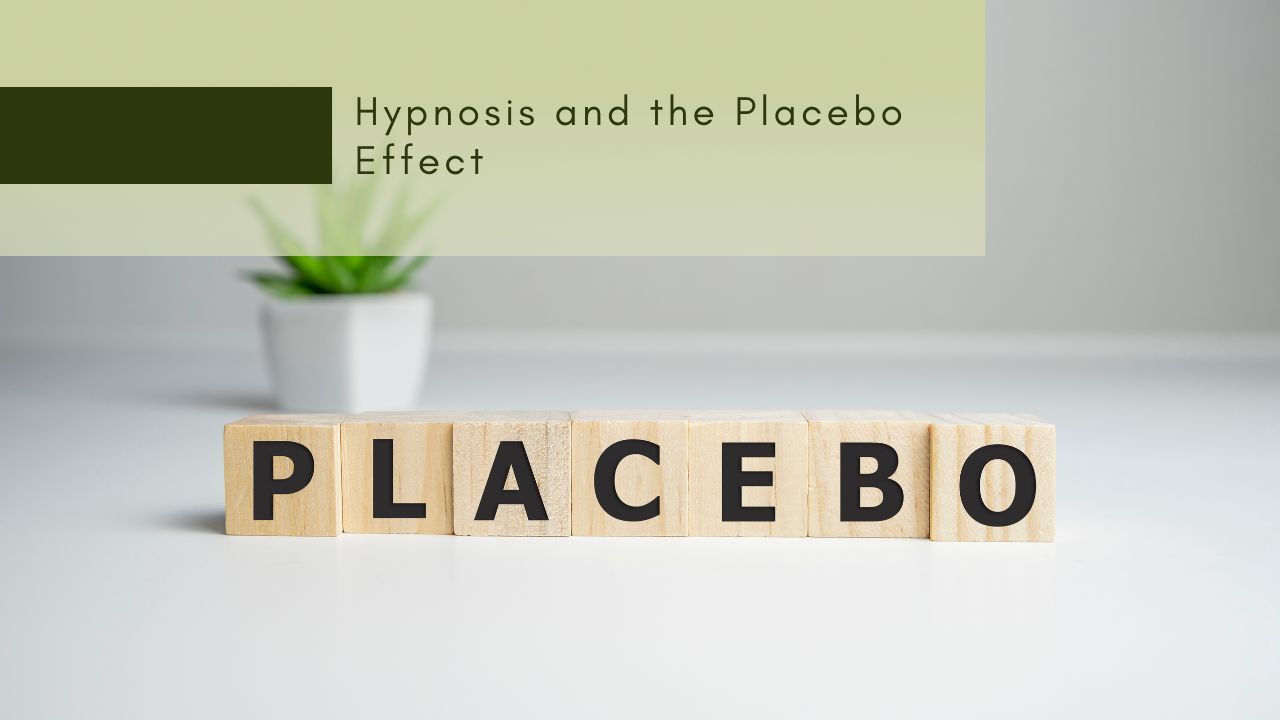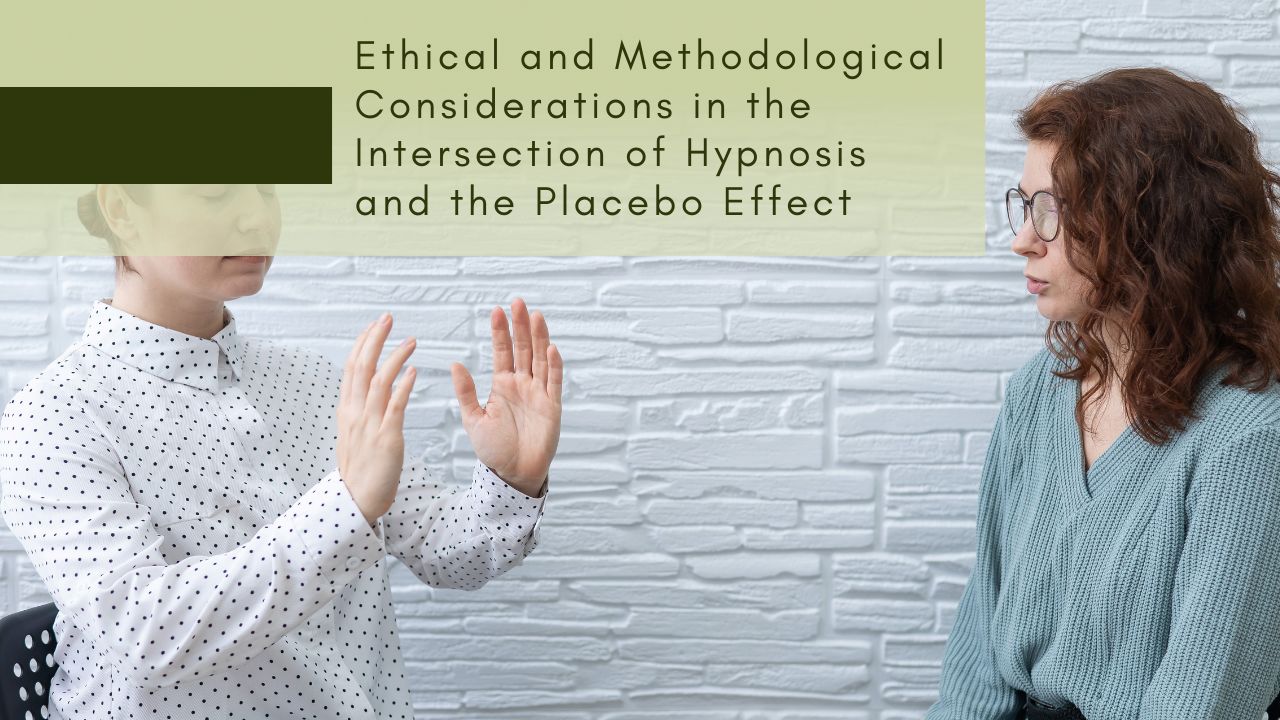What are the potential mechanisms or psychological processes underlying the placebo effect and hypnosis?
The placebo effect and hypnosis both involve complex psychological processes and mechanisms that influence perception, cognition, behavior, and physiological functioning. While they are distinct phenomena, they share some common mechanisms, including:
Expectation and belief
Expectation plays a central role in both the placebo effect and hypnosis. When individuals expect a treatment or intervention to be effective, they are more likely to experience positive outcomes. Beliefs about the treatment’s efficacy can shape perceptions, alter subjective experiences, and influence physiological responses.
Suggestion and conditioning
Both the placebo effect and hypnosis rely on suggestion and conditioning to induce changes in perception, cognition, and behavior. Suggestions provided by therapists or healthcare providers can influence the individual’s thoughts, feelings, and physiological responses. Through repeated exposure and reinforcement, individuals can become conditioned to respond to these suggestions, leading to changes in subjective experiences and behavior.
Attention and focus
Hypnosis involves a state of focused attention and heightened suggestibility, during which individuals become absorbed in their internal experiences and are more receptive to suggestions. Similarly, the placebo effect can be enhanced when individuals pay attention to the therapeutic context and focus on the expected benefits of the treatment.
Neurobiological processes
Both the placebo effect and hypnosis are associated with changes in brain activity and neurobiological processes. Neuroimaging studies have shown that placebo responses involve the activation of brain regions associated with pain modulation, reward processing, and emotion regulation. Similarly, hypnosis has been linked to alterations in brain functioning, including changes in connectivity patterns and activity within regions involved in attention, perception, and self-awareness.
Psychological factors
Psychological factors such as motivation, mood, and personality traits can influence the magnitude of the placebo effect and the responsiveness to hypnosis. Positive expectations, optimism, and a strong therapeutic alliance can enhance the placebo response and increase the effectiveness of hypnosis.
Contextual factors
The therapeutic context, including the therapist-client relationship, the treatment setting, and the therapeutic rituals and procedures, can shape the individual’s expectations and beliefs about the effectiveness of both the placebo and hypnosis. A supportive and empathetic therapeutic environment can enhance the placebo response and facilitate hypnotic induction and suggestion.
In summary, the placebo effect and hypnosis involve a complex interplay of psychological, cognitive, and neurobiological processes, highlighting the mind’s powerful influence on perception, behaviour, and well-being.
What is the current scientific understanding of the neurological or physiological changes associated with the placebo effect and hypnosis?
The current scientific understanding of the neurological and physiological changes associated with the placebo effect and hypnosis is still evolving, but research has identified several key findings:
Brain activation patterns
Neuroimaging studies have revealed that both the placebo effect and hypnosis are associated with changes in brain activity, particularly in regions involved in pain modulation, emotion regulation, and reward processing. For example, placebo analgesia is often accompanied by decreased activity in pain-processing areas such as the anterior cingulate cortex and increased activity in regions associated with endogenous opioid release, such as the nucleus accumbens and periaqueductal gray.
Neurotransmitter systems
The placebo effect and hypnosis have been linked to alterations in neurotransmitter systems, including the release of endogenous opioids, dopamine, and other neurochemicals that modulate pain perception, mood, and motivation. For example, placebo responses to pain have been associated with the activation of opioidergic pathways, while hypnotic analgesia has been linked to changes in both opioid and dopaminergic systems.
Sensory processing and perception
Both the placebo effect and hypnosis can influence sensory processing and perception, leading to alterations in the subjective experience of pain, discomfort, or other sensations. Neuroimaging studies have shown that placebo responses involve changes in sensory processing areas such as the somatosensory cortex, as well as higher-order brain regions involved in attention, expectation, and cognitive control.
Expectation and conditioning
Expectation and conditioning play crucial roles in both the placebo effect and hypnosis. Research has demonstrated that the anticipation of relief or benefit can activate neurobiological pathways associated with placebo responses, leading to changes in pain perception, mood, and other subjective experiences. Similarly, hypnotic suggestions can induce changes in brain activity and subjective experiences through expectation-driven mechanisms.
Modulation of autonomic and immune function
The placebo effect and hypnosis can modulate autonomic nervous system activity, immune function, and other physiological processes. For example, placebo responses have been shown to influence heart rate, blood pressure, and immune markers, while hypnosis has been associated with changes in cortisol levels, immune function, and other physiological parameters.
In summary, the current scientific understanding of the neurological and physiological changes associated with the placebo effect and hypnosis highlights the complex interplay of brain circuits, neurotransmitter systems, sensory processing mechanisms, and expectation-driven processes involved in these phenomena. Further research is needed to elucidate the specific neurobiological mechanisms underlying placebo responses and hypnotic phenomena and their implications for health, well-being, and clinical practice.
How do theories or models of the placebo effect align with or differ from theories explaining the mechanisms of hypnosis?
Theories and models of the placebo effect and hypnosis share some commonalities but also exhibit distinct differences in their explanations of underlying mechanisms such as:
Expectation and suggestion
Both the placebo effect and hypnosis are heavily influenced by expectation and suggestion. Theories of the placebo effect often emphasize the role of expectation in shaping subjective experiences and physiological responses, leading to the activation of endogenous mechanisms of healing or symptom relief. Similarly, hypnosis involves the use of suggestion to induce changes in perception, cognition, and behavior, leveraging the individual’s expectations and beliefs to facilitate therapeutic outcomes.
Altered states of consciousness
Hypnosis is often conceptualised as an altered state of consciousness characterized by focused attention, heightened suggestibility, and deep relaxation. Some theories of hypnosis propose that these altered states enable access to unconscious processes and facilitate changes in perception, memory, and behaviour. While the placebo effect may involve alterations in consciousness to some extent, it is typically viewed as a more context-dependent phenomenon driven by cognitive and affective factors such as expectation, conditioning, and social learning.
Neurobiological mechanisms
The placebo effect and hypnosis are associated with changes in brain activity and neurobiological processes, but the specific neural mechanisms underlying these phenomena may differ. Theories of the placebo effect often highlight the role of endogenous opioid systems, dopaminergic pathways, and other neurotransmitter systems in modulating pain perception, reward processing, and affective responses. In contrast, theories of hypnosis may emphasise the involvement of attentional networks, prefrontal cortex function, and alterations in connectivity patterns within the brain’s default mode network and executive control systems.
Contextual factors and ritualised procedures
Both the placebo effect and hypnosis are influenced by contextual factors such as the therapeutic setting, therapist-client interactions, and the use of ritualized procedures. Theories of the placebo effect emphasize the importance of contextual cues, expectancy effects, and social learning processes in shaping placebo responses. Similarly, hypnosis theories highlight the role of the therapeutic context, including the authority of the hypnotist, the use of suggestive language, and the induction of trance-like states, in promoting hypnotic responsiveness and therapeutic outcomes.
While theories of the placebo effect and hypnosis share some common principles, such as the importance of expectation, suggestion, and contextual factors, they also exhibit differences in their conceptualisations of altered states of consciousness, neurobiological mechanisms, and the specific processes underlying these phenomena. Integrating insights from both domains may provide a more comprehensive understanding of the complex interplay of psychological, cognitive, and neurobiological factors involved in placebo responses and hypnotic phenomena.
Can hypnosis be used to modulate or study the placebo effect more directly?
Yes, hypnosis can be used as a tool to modulate or study the placebo effect more directly. Hypnosis provides a means of inducing altered states of consciousness, increasing suggestibility, and enhancing the individual’s ability to respond to suggestion and expectation. By leveraging these characteristics, researchers can manipulate the hypnotic state to examine its effects on placebo responses and related phenomena.
Are there specific characteristics or individual differences that make some people more susceptible to the placebo effect or more responsive to hypnosis?
Yes, there are specific characteristics and individual differences that can influence susceptibility to the placebo effect and responsiveness to hypnosis. Some of these factors include:
Personality traits
Certain personality traits, such as openness to experience, suggestibility, and hypnotic susceptibility, are associated with greater responsiveness to both the placebo effect and hypnosis. Individuals who are more open-minded, imaginative, and receptive to new experiences tend to be more susceptible to suggestion and may experience stronger placebo responses and deeper hypnotic states.
Beliefs and expectations
Beliefs about the effectiveness of a treatment or intervention can strongly influence the placebo effect and responsiveness to hypnosis. Individuals who have positive expectations, confidence in the therapeutic process, and a belief in their ability to benefit from treatment are more likely to experience positive outcomes.
Motivation and engagement
The placebo effect and hypnosis can be influenced by the individual’s level of motivation and engagement in the therapeutic process. People who are actively engaged in treatment, motivated to improve their well-being, and committed to following therapeutic suggestions are more likely to experience positive effects.
Cognitive factors
Cognitive factors such as attentional focus, cognitive flexibility, and cognitive control can affect susceptibility to suggestion and responsiveness to hypnosis. Individuals who are able to focus their attention, engage in imagery or visualisation techniques, and suspend disbelief are more likely to benefit from both the placebo effect and hypnosis.
Cultural and social influences
Cultural beliefs, social norms, and prior experiences with hypnosis or similar treatments can shape susceptibility to the placebo effect and responsiveness to hypnosis. Cultural factors may influence beliefs about the mind-body connection, attitudes toward alternative therapies, and the acceptability of suggestion and trance states.
Genetic factors
There is evidence to suggest that genetic factors may play a role in individual differences in susceptibility to the placebo effect and responsiveness to hypnosis. Some studies have identified genetic variations associated with neurotransmitter systems, such as the dopamine and opioid systems, that may influence suggestibility and hypnotic susceptibility.
Susceptibility to the placebo effect and responsiveness to hypnosis are multifaceted and can be influenced by a combination of personality traits, beliefs and expectations, motivation and engagement, cognitive factors, cultural and social influences, and genetic factors. By understanding these individual differences, therapists and healthcare providers can tailor treatment approaches to better meet the needs of their clients and maximize therapeutic outcomes.




